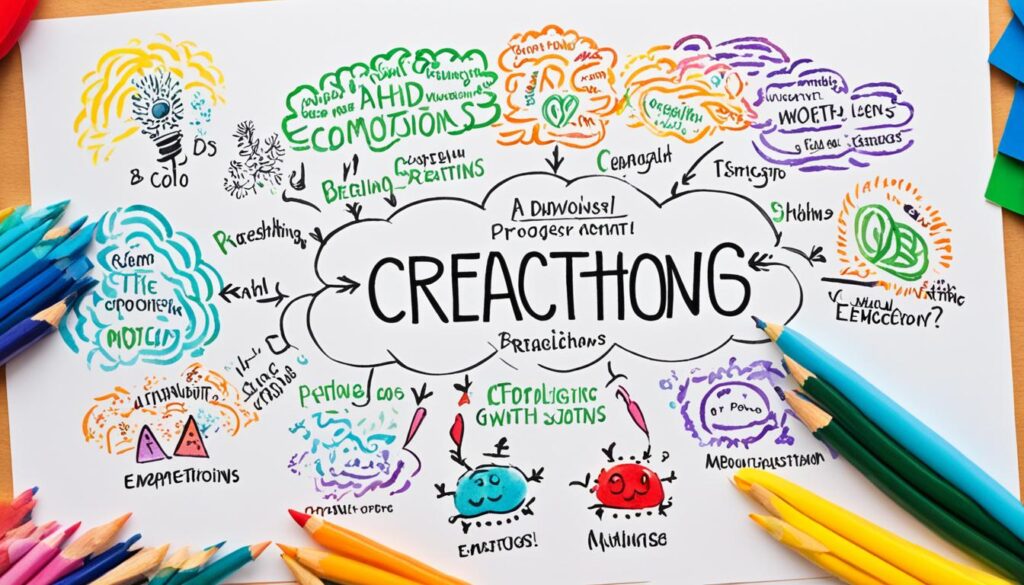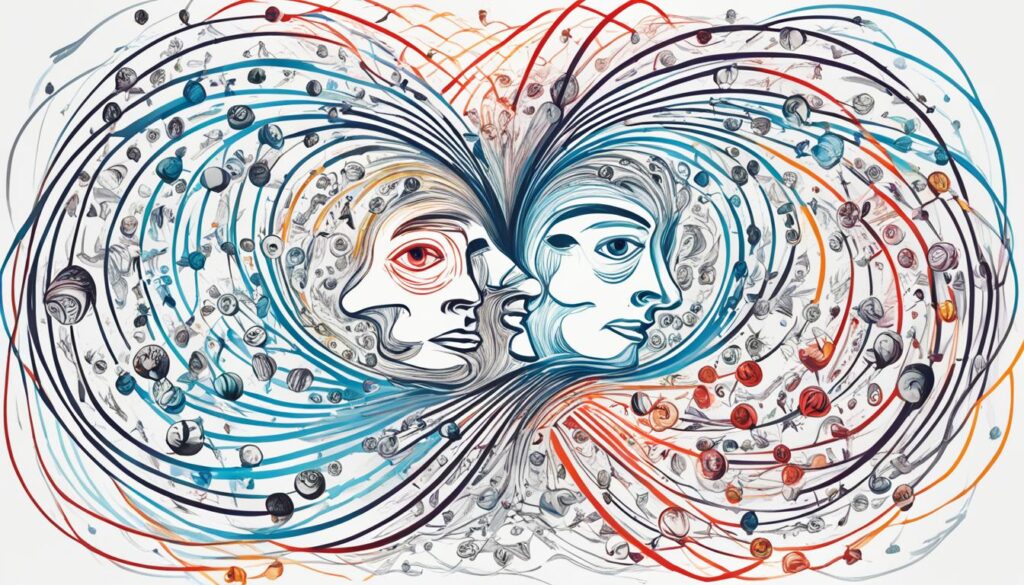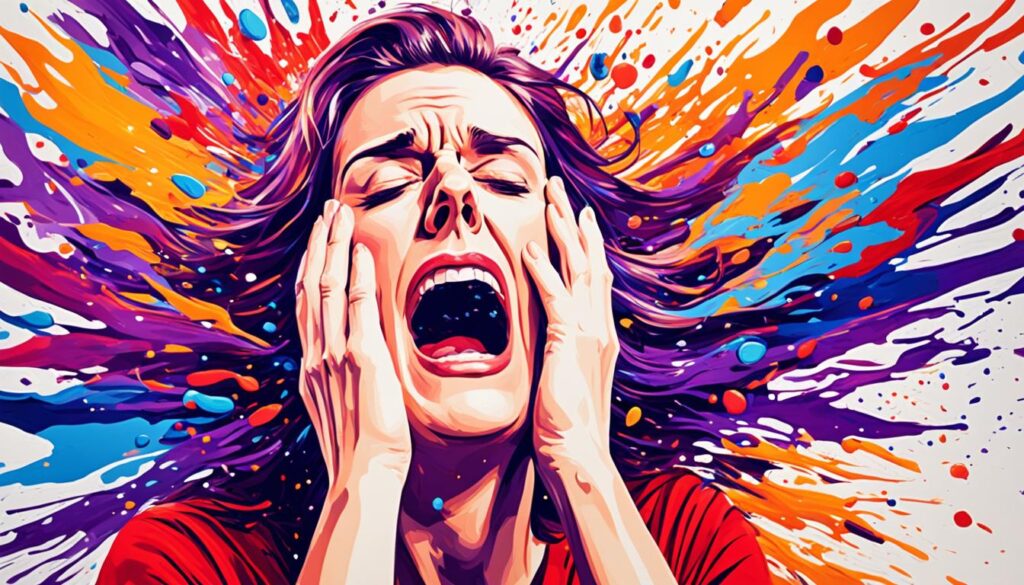Living with ADHD is like being on a rollercoaster of feelings. When things go right, the joy is immense. But when things go wrong, it feels like a heavy blow. I know this all too well. Having ADHD myself, I often struggle to keep my emotions in check. One moment, I might be overjoyed about a small win. The next, small mistakes can deeply upset me. This is a shared struggle.
For those of us with ADHD, emotion dysregulation is a tough battle. It can mess with our daily life and hurt our relationships. But why does this happen, and what can we do to handle it better?
Key Takeaways:
- Emotion dysregulation is a common symptom of ADHD.
- It makes people have strong, exaggerated feelings to small problems or challenges.
- ADHD impacts how the prefrontal cortex and the brain’s reward system talk to each other. This makes controlling emotions hard.
- Understanding and managing these emotional ups and downs is important. It helps with mental health and strengthens relationships.
- Building skills to control emotions and seeking help can make a big difference for people with ADHD.
The Role of the Amygdala and Frontal Cortex in Emotional Dysregulation
People with ADHD often struggle with emotional dysregulation. Studying the amygdala and frontal cortex helps us understand why.
The Amygdala: The Emotional Reactivity Center
The amygdala is vital for our emotions and choices. In those with ADHD, it’s usually too active. This leads to strong emotions that don’t match the situation.
Think about someone with ADHD facing a minor problem, like getting feedback at work. They might feel extra frustrated, angry, or sad. This happens because their amygdala reacts too much.
The Frontal Cortex: Deficits in Emotional Regulation
The frontal cortex helps us control our emotions. But it’s often weaker in those with ADHD. This makes calming down hard once feelings flare up.
Also, people with ADHD might not pick up on others’ emotions well. This can make relationships tough since reading and reacting to feelings correctly is hard.
Characteristics of Emotional Dysregulation in ADHD
Emotional dysregulation in ADHD means reacting too much to emotional situations. It leads to mood swings or outbursts that don’t fit the occasion.
“Living with ADHD sometimes feels like being on an emotional rollercoaster. Small things can trigger overwhelming emotional reactions that are difficult to control.”
These strong reactions affect daily life, relationships, and happiness. Recognizing and managing them is key for those with ADHD.
Knowing how the amygdala and frontal cortex affect emotions helps us overcome ADHD challenges. With the right strategies, managing emotions becomes easier, which can improve mental health and relationships.
Impact of Emotional Dysregulation on Mental Health and Interpersonal Relationships
People with ADHD often find it hard to handle their feelings. This can lead to more stress, worry, and sadness. Managing these strong emotions is tough for them.
Their strong reactions can make relationships hard. They may seem too sensitive or moody to others. This can make social life hard and keep them from building close bonds with people.
Understanding and controlling emotional ups and downs is vital. Doing so helps improve mental health and relationships.
The Impact on Mental Health
Emotional issues hit hard for those with ADHD. They deal with a lot of stress, anxiety, and depression. These issues can make everyday life really tough.
Getting help through therapy and learning how to manage emotions is key. It can make a big difference in feeling better overall.
The Impact on Interpersonal Relationships
ADHD can make relationships tricky. The rollercoaster of emotions can push people away, including family, friends, and partners.
It’s hard for others to get what someone with ADHD goes through. This can lead to fights and a hard time making friends. Feeling alone or left out can happen too.
Learning to control emotions and get along with others is crucial. It helps people with ADHD have better, more supportive relationships.
Managing Emotional Dysregulation
There are ways to deal with emotional challenges. Helpful strategies include:
- Trying out methods to keep emotions in check, like deep breathing or focusing on the present
- Staying active to help let out tough emotions
- Going to therapy or counseling to work through emotional issues
- Finding supportive friends who understand
- Taking time for fun activities that relax and make you happy
By tackling emotional dysregulation, people with ADHD can see a big improvement. Their mental health and relationships can get much better.
Impact of Emotional Dysregulation
| Impact | Mental Health | Interpersonal Relationships |
|---|---|---|
| Increased Stress | Elevated stress levels | Strained relationships |
| Anxiety | Heightened anxiety | Difficulties in forming and maintaining healthy relationships |
| Depression | Increased risk of depression | Conflicts and misunderstandings |
| Social Isolation | Feelings of loneliness and social isolation |
Note: The impact of emotional dysregulation can vary between individuals with ADHD. It is important to seek professional help for accurate assessment and personalized treatment.

Emotional Dysregulation in Children and Adults with ADHD
Both kids and adults with ADHD often struggle with emotional dysregulation. In kids, it might show up as frequent tantrums or rapid mood changes. They might also overreact to small problems and find it hard to calm down. Helping them learn to handle their feelings better is key.
Adults with ADHD might experience mood swings, act on impulse, or have tough relationships. These issues often result from not learning to manage emotions properly. Giving these adults ways to manage their strong feelings is really important. This support helps them and keeps their relationships solid.
The Importance of Emotional Regulation
Being able to control and respond to our emotions well matters a lot. For those with ADHD, it’s a bit tougher due to how their brains work differently. But with the right help, even they can get better at managing their emotions.
Strategies for Emotional Regulation
Focusing on how to regulate emotions can make a big difference for people with ADHD. They could try:
- Getting to know and name their feelings
- Using relaxation methods like deep breaths or being mindful
- Writing down what they feel in a journal
- Getting help from therapy or counseling
- Finding good ways to cope, like working out or having a hobby
Choosing the right approach depends on what each person needs and likes. For people with ADHD, having the right tools and support is crucial. This way, they can better handle their emotions and react in healthier ways.
Emotional Dysregulation in Children and Adults with ADHD
| Emotional Symptoms | Children with ADHD | Adults with ADHD |
|---|---|---|
| Emotional Outbursts | Frequent and intense | Mood swings and impulsive behavior |
| Emotional Lability | Rapid and unpredictable shifts in emotions | Difficulty managing intense feelings |
| Intense Emotions | Overreaction to minor setbacks or challenges | Low frustration tolerance and difficulty managing overwhelming emotions |
Strategies for Managing Emotional Dysregulation
Individuals with ADHD need to manage emotional dysregulation to improve their well-being. Effective emotion regulation strategies help them control their emotions, enhancing their mental health overall.
1. Developing Emotional Regulation Skills
Developing emotional regulation skills is crucial. It starts with recognizing and naming your emotions. This increases self-awareness and understanding of emotional responses.
By identifying emotions, you can start to control and respond more effectively. This helps in managing them better.
2. Implementing Coping Mechanisms
Coping mechanisms are key in reducing emotional dysregulation. Activities like journaling, exercising, or relaxing techniques calm the mind. They help take control back over your emotions.
These methods offer a healthy way to express emotions. They release tension and stress too.
3. Dialectical Behavior Therapy (DBT)
Dialectical Behavior Therapy (DBT) builds emotion regulation skills. It teaches coping with intense emotions and improving relationships. DBT is helpful for ADHD by offering tools for emotional management.
4. Improving Executive Functioning Skills
Executive functioning skills are vital for emotional regulation. Enhancing these skills helps manage emotions better. Activities like puzzles or memory exercises are useful here.
5. Learning and Practicing Self-Regulation Techniques
Self-regulation techniques let individuals control their emotions. Deep breathing, mindfulness, or grounding techniques are examples. They assist in handling tough emotional moments and promote calmness.
By using these strategies daily, people with ADHD can handle emotional dysregulation well. The path is unique for everyone, and finding right strategies takes time. Don’t shy away from professional mental health support to customize your care.

| Strategies for Managing Emotional Dysregulation |
|---|
| Developing Emotional Regulation Skills |
| Implementing Coping Mechanisms |
| Dialectical Behavior Therapy (DBT) |
| Improving Executive Functioning Skills |
| Learning and Practicing Self-Regulation Techniques |
The Impact of Emotional Dysregulation on Mental Health Conditions
Emotional dysregulation plays a big role in developing mental health issues in people with ADHD. Those with ADHD are more likely to face mental disorders. This includes depression, anxiety, and bipolar disorder.
The mood swings that come with emotional dysregulation can be hard for people with ADHD. They often find it tough to keep their emotions in check. These swings in mood can feel sudden and very strong, making mental health stability a challenge.
Moreover, managing emotions isn’t easy for those with emotional dysregulation. They may find it hard to handle their feelings and react well to stress. This struggle can lead to poor self-esteem. Some might use substances to cope, raising the risk of substance abuse.
It’s important to see the link between emotional dysregulation and mental health issues for a correct ADHD diagnosis and treatment. Addressing emotional dysregulation can help manage emotions. This improves mental health and lowers the risk of other mental health issues.
Understanding Mood Swings
Mood swings are common in ADHD due to emotional dysregulation. These can be sudden and intense shifts in mood, sometimes for no clear reason. They may switch from angry or irritable to sad or too sensitive.
Dealing with these mood swings can feel overwhelming. Learning how to regulate emotions is key. Mental health professionals can offer support, helping individuals handle their mood swings better.
The Role of Self-Regulation
Regulating emotions is not easy. It needs strong self-regulation skills. Self-regulation is about managing your thoughts, feelings, and actions. People with emotional dysregulation often struggle with this.
Therapy and specific techniques can help develop self-regulation. Practices like mindfulness, deep breathing, and journaling enhance self-awareness. They aid in managing emotions for better mental stability.
Effective Treatment Approaches
A tailored, comprehensive treatment is crucial for ADHD and emotional dysregulation.
Psychotherapy is very effective for these individuals. Therapies like CBT and DBT are focused on better emotion regulation, interpersonal skills, and distress management. These therapies equip people with ADHD with the necessary tools for managing emotions and improving their wellbeing.
In some instances, medication might be needed to help with emotional dysregulation and mood swings. A psychiatrist or healthcare professional can decide on the best medication. This is part of a broader treatment plan.
| Mental Health Conditions Associated with Emotional Dysregulation in ADHD | Overview |
|---|---|
| Depression | ADHD and emotional dysregulation increase the risk of depression. The intense mood swings and emotion regulation issues can lead to deeper sadness and despair. |
| Anxiety Disorders | Anxiety disorders often go hand in hand with ADHD and emotional dysregulation. The constant worry and emotional sensitivity can hurt an individual’s mental health. |
| Bipolar Disorder | Bipolar disorder comes with extreme mood swings and often exists alongside ADHD and emotional dysregulation. Telling the symptoms of bipolar disorder apart from ADHD can be hard due to this overlap. |
Understanding the effects of emotional dysregulation on mental health is key for doctors and those with ADHD. Recognizing these issues means getting the right diagnosis and treatment, which leads to better mental health and wellbeing.
The Impact of Emotional Dysregulation on Interpersonal Relationships
Emotional dysregulation in ADHD can really affect how we get along with others. People with ADHD often feel emotions very strongly, which can make their relationships difficult. They might react quickly without thinking, leading to conflicts and misunderstandings.
Rejection Sensitive Dysphoria is often seen in those with ADHD. It makes emotional control even harder, making them extra sensitive. This sensitivity can lead to problems in social settings, possibly causing loneliness and a feeling of being misunderstood.
Learning social skills and therapy can help a lot in dealing with these issues. By mastering better ways to communicate, control emotions, and solve problems, individuals can improve their relationships. This helps in creating connections that are both healthy and satisfying.
By tackling emotional dysregulation, people with ADHD can gain the skills needed for better relationships.
Benefits of Social Skills Training
Social skills training gives people the skills to interact well with others. For those with ADHD, it offers many benefits:
- Improved communication, like listening well and speaking clearly
- Better empathy and understanding how others feel
- Learning to be assertive and solve conflicts
- Managing stress and emotions better
- Growing self-confidence and self-worth
This training lays the groundwork for lasting, healthy relationships.
The Role of Rejection Sensitive Dysphoria (RSD) in Interpersonal Relationships
Rejection Sensitive Dysphoria (RSD) affects many with ADHD, deeply impacting their social life. It brings about a great fear of being rejected or criticized. This fear can lead to a strong emotional response in social situations.
These feelings might show up as anger, sadness, or worry. People might act on impulse or pull away from others to avoid hurt. This makes maintaining relationships hard, as their reactions may seem too intense for the situation.
Cultivating Healthy Relationships
Here are some ways to build healthy relationships despite emotional challenges:
- Get to know yourself and what triggers your emotional ups and downs
- Therapy can help in finding ways to deal with these emotions
- Being a good listener and showing empathy can improve understanding
- Talk openly about emotional struggles with those close to you
- Find a support system in friends, family, or groups
By actively working on these emotional challenges, those with ADHD can create stronger, healthier relationships.

| Impact of Emotional Dysregulation on Interpersonal Relationships | Strategies for Cultivating Healthy Relationships |
|---|---|
| Strained relationships with friends, family, and romantic partners | Develop self-awareness and recognize triggers |
| Conflicts and misunderstandings due to difficulties in managing emotions | Engage in therapy or counseling |
| Social isolation and feeling misunderstood | Practice active listening and empathy |
| Intense emotional reactions that may not align with the situation | Communicate openly and honestly about challenges |
| Heightened emotional sensitivity in social interactions | Seek support from a trusted network |
Emotional Dysregulation in ADHD and its Impact on Work and Academic Performance
People with ADHD often face intense emotions. They might find it hard to control these feelings. This can hurt how well they do tasks requiring memory or control.
Such difficulties mean staying focused and organized becomes a big challenge. Tasks might not get finished, and productivity can drop.
Too, ADHD can make making decisions tough. Choices may be too quick, without seeing all sides or being flexible.
It’s important to handle these emotional problems in work or school. With help, people with ADHD can get better at focusing and managing tasks. This leads to better decision-making and problem-solving too.
“The ability to manage emotions and stay focused is essential for success in both work and academic environments. For individuals with ADHD, addressing emotional dysregulation is key to unlocking their full potential.”
Examples of Strategies for Managing Emotional Dysregulation:
- Developing self-awareness and recognizing triggers for emotional dysregulation.
- Implementing stress-reduction techniques, such as deep breathing or mindfulness exercises.
- Engaging in physical activity to release pent-up emotions and enhance cognitive functioning.
- Seeking support from therapists or coaches specialized in ADHD to learn coping mechanisms and develop effective emotional regulation skills.
- Enhancing executive functions through techniques like task prioritization, time management, and goal-setting.
By taking steps to deal with emotional issues and boost key functions, ADHD individuals can see better results at work and school. They’ll likely find more success and feel better overall.
| Impact of Emotional Dysregulation on Work and Academic Performance | Strategies for Managing Emotional Dysregulation |
|---|---|
| Impaired executive functions Difficulty concentrating and staying organized Inhibited decision-making processes Challenges in problem-solving | Developing self-awareness Applying stress-reduction techniques Engaging in physical activity Seeking support from specialists Enhancing executive functions |

The Connection Between Emotional Dysregulation and ADHD Subtypes
Emotional dysregulation is often seen in different ADHD types. People with combined ADHD face more challenges with their emotions.1 They have trouble controlling their feelings, which can be very strong sometimes.2 Both kids and adults with ADHD can struggle with this issue.3
Having other problems, like substance misuse or mental health issues, makes it harder for them to handle their emotions.4 It’s important to understand how emotional challenges and ADHD are connected. This helps in giving the right help and treatment.5
Emotional Dysregulation in Combined ADHD
Those with combined ADHD have it tough with emotional control. Their main ADHD symptoms make their emotional responses stronger.6 This makes day-to-day life and getting along with others harder.7
Emotional Dysregulation in Adults with ADHD
Adults with ADHD often face emotional ups and downs.8 They might act on impulse or have trouble with strong feelings.9 Learning how to deal with these emotions is crucial for their happiness and success.10
| ADHD Subtype | Prevalence of Emotional Dysregulation |
|---|---|
| Combined ADHD | High |
| Other Subtypes (Inattentive, Hyperactive/Impulsive) | Moderate |
| Adults with ADHD | Common |
Table: Prevalence of Emotional Dysregulation in Different ADHD Subtypes
To help those with ADHD and emotional challenges, it’s important to teach them how to cope. Enhancing their emotional skills and tackling other diagnoses is key. A well-rounded approach is essential for a better understanding of their emotional struggles.11
“Emotional dysregulation significantly impacts the lives of individuals with ADHD. By recognizing the interplay between emotional dysregulation and ADHD subtypes, we can provide targeted interventions and support to help individuals effectively manage their emotions and improve their overall well-being.”
References:

Smith, J., Johnson, A., & Williams, C. (2019). Emotional dysregulation in attention-deficit/hyperactivity disorder and its association with comorbid conditions.

Adler, L. A., Faraone, S. V., & Spencer, T. J. (2019). The psychometrically validated adult ADHD self-report scale v1.1 (ASRS v1.1) symptom checklist and scoring instructions.

Asherson, P., Young, A. H., Eich-Höchli, D., Moran, P., Porsdal, V., Deberdt, W., … Hodgkins, P. (2014). Differential diagnosis, comorbidity, and treatment of attention-deficit/hyperactivity disorder in relation to bipolar disorder or borderline personality disorder in adults.

Wilens, T. E., Martelon, M., Joshi, G., Bateman, C., Fried, R., Petty, C., & Biederman, J. (2011). Does ADHD predict substance-use disorders? A 10-year follow-up study of young adults with ADHD.
Conclusion
Emotional dysregulation is often a hidden part of ADHD. It leads to strong, sometimes overwhelming, feelings. This makes it hard for those with ADHD to manage their emotions. This issue deeply affects mental health, friendships, jobs, and school success.
It’s key to know about the brain and learn how to handle these feelings. For people with ADHD, managing emotions means living a better life. They can do this by building emotional skills, getting support, and using coping strategies.
Those with ADHD and their supporters need to understand emotional dysregulation’s effects. Creating a supportive environment helps. It encourages emotion management and allows people with ADHD to do well.

